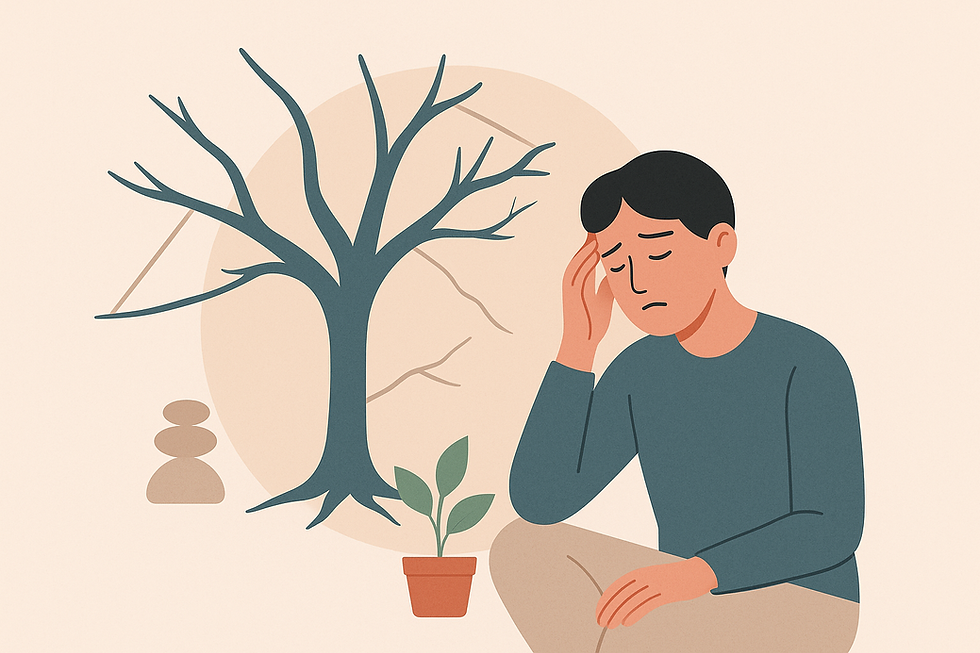The Power of Mental Health Sensitivity in Relationships
- Anjali Gulati
- Nov 9, 2024
- 3 min read

In a world that’s more connected than ever, we often find ourselves tangled in misunderstandings, broken tempers, and unspoken and unresolved tensions.
Research suggests that one common root of these issues is a lack of mental health sensitivity.
The term “mental health sensitivity” might sound like therapy jargon, but it boils down to something essential and universal: recognizing that everyone’s emotional well-being impacts their behaviors and interactions. When we overlook the mental health dimension of relationships, we miss a huge piece of what makes human connections fade —or prosper.
What is Mental Health Sensitivity ?
Simply put, mental health sensitivity means being aware of, and responsive to, the emotional and psychological states of others. This doesn’t mean we need to become therapists for everyone we know, but rather that we aim to understand their perspective with empathy and awareness.
According to a 2022 study published in Personality and Social Psychology Review, Individuals who practice mental health sensitivity tend to have more resilient and supportive relationships. The research emphasizes that people are often quick to personalize conflicts or brush off emotional cues. Instead of interpreting someone’s irritability as a personal slight, mental health sensitivity encourages us to consider what stressors or challenges might be contributing to their behavior.
Why It's Needed Now More than Ever ?
Statistics from the World Health Organization indicate that globally, 1 in 8 people live with mental health conditions, yet stigma and misunderstanding persist. Closer to home, mental health issues have surged since the pandemic, with the National Alliance on Mental Illness reporting a 40% increase in anxiety and depression in young adults alone.

This isn’t just about abstract numbers—these are real people trying to maneuver work, friendships, and romantic relationships while shouldering heavy, often invisible burdens.
Yet, mental health is rarely discussed openly in relationships. A survey by the American Psychological Association (2023) found that nearly 60% of individuals hesitate to bring up their mental health challenges, fearing judgment or rejection.
This silence can lead to resentment, isolation, and misunderstandings within relationships—creating a rift where there could be empathy and support.
The Impact on Relationships
Mental health sensitivity can profoundly shape our personal connections. In friendships, sensitivity toward mental health can mean offering patience to a friend who may withdraw during depressive episodes, rather than assuming they’re disinterested or aloof. Within romantic relationships, it can manifest as recognizing the toll that work stress or family issues might take on a partner’s mood.

Workplace relationships benefit from mental health sensitivity as well. By recognizing a colleague’s signs of burnout or stress, we can foster a supportive environment that encourages communication rather than competition or resentment.
Research from Harvard Business Review indicates that teams with high mental health awareness are 20% more effective, and employees feel more valued and engaged.
Practising Mental Health Sensitivity: Start Small
Incorporating mental health sensitivity doesn’t require grand gestures—it’s about small shifts in mindset and behavior. Start by listening actively, resisting the urge to offer unsolicited advice. Instead of jumping to conclusions, ask gentle questions: “Are you doing okay?” or “Is there something on your mind?” Acknowledging emotions, both your own and others’, is a huge first step.
1. Listen Actively
Active listening involves focusing fully on what the other person is saying, without mentally planning your response. Research from Harvard’s Center for Emotional Intelligence suggests that people feel more validated and open when they feel heard without interruption.
2. Educate Yourself
A 2021 study from the National Alliance on Mental Illness (NAMI) found that individuals who engaged in mental health education—whether through workshops or reading—were 35% more likely to engage in supportive, nonjudgmental conversations about mental health.
3. Avoid Snap Judgements
Understanding that mental health struggles aren’t a “choice” but rather a complex interaction of genetic, environmental, and situational factors can help us approach others with empathy. Simple affirmations like “I’m here for you” or “I can imagine this is tough” can make a big difference.
4. Model Vulnerability
Psychologists like Dr. Brené Brown have popularized the idea that vulnerability breeds connection. By sharing your own struggles and feelings, you invite others to do the same, fostering mutual understanding.
Building Relationships That Last
Mental health sensitivity isn’t a silver bullet for every relational issue, but it opens doors to understanding and compassion that might otherwise remain closed. As we learn to view each other with more empathy, we build relationships that aren’t just resilient in the face of challenges but also rooted in genuine care.

In a society where we often feel pressured to keep up appearances, mental health sensitivity allows us to embrace the reality that everyone is carrying something and also that we don't have to carry it alone. :)



Comments